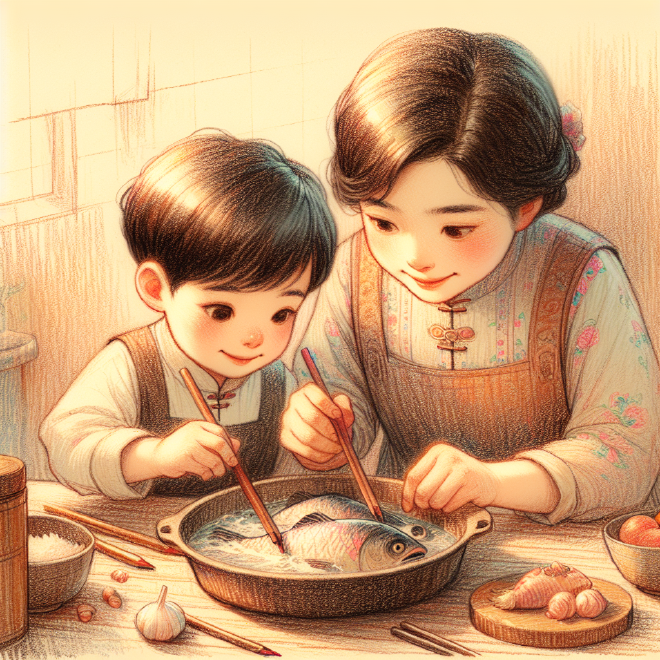盲盒情緣

Table of Contents
Audio #
汉字 #
丽丽想给妈妈准备母亲节礼物。她很烦恼,不知道送什么好。她的好朋友小明知道了,就来找她。
“丽丽,你为什么不高兴?”小明问。
丽丽叹了口气说:“母亲节快到了,我想给妈妈一个惊喜,可是我不知道送什么。花太普通了,衣服妈妈也不缺。”
小明笑着说:“我知道!不如我们一起做一道特别的菜?你妈妈最喜欢吃你做的饭了。”
丽丽眼睛一亮:“真的吗?做什么菜好呢?”
小明想了想说:“我们可以做糖醋鱼。你妈妈喜欢吃酸甜的,而且鱼也很有营养。”
丽丽高兴地说:“太好了!我们现在就去买菜吧!”
他们一起去超市买了鱼和其他需要的材料。回到家,他们开始认真地做菜。丽丽负责洗鱼和切菜,小明负责调料。他们一边做,一边说说笑笑,非常开心。
终于,糖醋鱼做好了。丽丽尝了一口,酸酸甜甜的,味道好极了!她相信妈妈一定会喜欢的。
母亲节那天,丽丽和妈妈一起吃了这道特别的糖醋鱼。妈妈吃得津津有味,高兴地说:“这是我收到的最好的礼物!” 丽丽和小明听了,心里都非常开心。
Pinyin #
Lìlì xiǎng gěi māma zhǔnbèi mǔqīnjié lǐwù. Tā hěn fánnǎo, bù zhīdào sòng shénme hǎo. Tā de hǎo péngyou Xiǎomíng zhīdào le, jiù lái zhǎo tā.
“Lìlì, nǐ wèishénme bù gāoxìng?” Xiǎomíng wèn.
Lìlì tàn le yī kǒu qì shuō: “Mǔqīnjié kuài dào le, wǒ xiǎng gěi māma yī ge jīngxǐ, kěshì wǒ bù zhīdào sòng shénme. Huā tài pǔtōng le, yīfu māma yě bù quē.”
Xiǎomíng xiàozhe shuō: “Wǒ zhīdào! Bùrú wǒmen yīqǐ zuò yī dào tèbié de cài? Nǐ māma zuì xǐhuan chī nǐ zuò de fàn le.”
Lìlì yǎnjīng yī liàng: “Zhēn de ma? Zuò shénme cài hǎo ne?”
Xiǎomíng xiǎng le xiǎng shuō: “Wǒmen kěyǐ zuò tángcù yú. Nǐ māma xǐhuan chī suān tián de, érqiě yú yě hěn yǒu yíngyǎng.”
Lìlì gāoxìng de shuō: “Tài hǎo le! Wǒmen xiànzài jiù qù mǎi cài ba!”
Tāmen yīqǐ qù chāoshì mǎi le yú hé qítā xūyào de cáiliào. Huí dào jiā, tāmen kāishǐ rènzhēn de zuò cài. Lìlì fùzé xǐ yú hé qiē cài, Xiǎomíng fùzé tiáoliào. Tāmen yībiān zuò, yībiān shuō shuō xiào xiào, fēicháng kāixīn.
Zhōngyú, tángcù yú zuò hǎo le. Lìlì cháng le yī kǒu, suān suān tián tián de, wèidào hǎo jí le! Tā xiāngxìn māma yīdìng huì xǐhuan de.
Mǔqīnjié nà tiān, Lìlì hé māma yīqǐ chī le zhè dào tèbié de tángcù yú. Māma chī de jīn jīn yǒu wèi, gāoxìng de shuō: “Zhè shì wǒ shōu dào de zuì hǎo de lǐwù!” Lìlì hé Xiǎomíng tīng le, xīnlǐ dōu fēicháng kāixīn.
English Translation #
Lili wanted to prepare a Mother’s Day gift for her mom. She was very worried, not knowing what to give. Her good friend Xiaoming found out and came to find her.
“Lili, why are you unhappy?” Xiaoming asked.
Lili sighed and said, “Mother’s Day is coming soon, and I want to give my mom a surprise, but I don’t know what to give. Flowers are too ordinary, and Mom doesn’t lack clothes.”
Xiaoming smiled and said, “I know! Why don’t we make a special dish together? Your mom loves to eat the food you make the most.”
Lili’s eyes lit up: “Really? What dish should we make?”
Xiaoming thought for a moment and said, “We can make sweet and sour fish. Your mom likes to eat sweet and sour things, and fish is also very nutritious.”
Lili happily said: “That’s great! Let’s go buy groceries now!”
They went to the supermarket together and bought fish and other needed materials. Back home, they began to seriously cook. Lili was responsible for washing the fish and cutting vegetables, and Xiaoming was responsible for the seasoning. They cooked and chatted and laughed, and were very happy.
Finally, the sweet and sour fish was ready. Lili took a bite, sweet and sour, the taste was great! She believed her mom would definitely like it.
On Mother’s Day, Lili and her mom ate this special sweet and sour fish together. Mom ate with relish and happily said, “This is the best gift I’ve ever received!” Lili and Xiaoming were very happy when they heard that.
Grammatical Points and Analysis #
是…的 structure: #
- This structure is used for emphasis. “这是我收到的最好的礼物! (Zhè shì wǒ shōu dào de zuì hǎo de lǐwù!)” highlights the fact that the gift is the best she’s received.
Adverbs of Degree: #
- 很 (hěn), 非常 (fēicháng), 太 (tài): These adverbs modify adjectives to show the degree of the quality. For example, “很烦恼 (hěn fánnǎo)” means “very worried.”
Resultative Complements: #
- 做好 (zuò hǎo): 好 indicates that the action of doing (做 zuò) has been completed successfully.
- 到 (dào): “母亲节快到了 (Mǔqīnjié kuài dào le)” “到” indicates the event is reaching.
Question Pronoun: #
- 什么时候 (shénme shíhou) is used for the meaning of “what”. It can be used to ask about things to be done.
Reduplication of verbs and adjectives: #
- 说说笑笑(shuō shuō xiào xiào): indicates continuous or repeated actions.
- 酸酸甜甜(suān suān tián tián): indicates the nature of sth is sweet and sour
Suggestion Formula #
- 不如 (bùrú)
Questions #
Question 1: 为什么丽丽一开始不知道送什么母亲节礼物? (Wèishénme Lìlì yī kāishǐ bù zhīdào sòng shénme mǔqīnjié lǐwù?) Why didn’t Lili know what Mother’s Day gift to give at first?
Click to show the answer
Answer: #
丽丽觉得花太普通了,而且妈妈也不缺衣服。(Lìlì juéde huā tài pǔtōng le, érqiě māma yě bù quē yīfu.) Lili felt that flowers were too ordinary, and her mom didn’t lack clothes.
Question 2: 小明建议做什么菜?为什么? (Xiǎomíng jiànyì zuò shénme cài? Wèishénme?) What dish did Xiaoming suggest making? Why?
Click to show the answer
Answer: #
小明建议做糖醋鱼。因为丽丽的妈妈喜欢吃酸甜的,而且鱼也很有营养。(Xiǎomíng jiànyì zuò tángcù yú. Yīnwèi Lìlì de māma xǐhuan chī suān tián de, érqiě yú yě hěn yǒu yíngyǎng.) Xiaoming suggested making sweet and sour fish. Because Lili’s mom likes to eat sweet and sour things, and fish is also very nutritious.
Disclaimer: This story is purely fictional and generated by AI. Any similarities to real people, places, or events are purely coincidental.